In alignment with the University of Nevada, Reno’s Carnegie R1 status, the University Libraries provides and creates innovative resources and services that meet the diverse and evolving needs of researchers. In support of scholarly and creative activity, we seek new partnerships, both locally and globally, to strengthen the scholarly infrastructure of the campus. We aim to integrate library services and expertise throughout the research lifecycle and to support scholarly work in all its inspired forms.
Empower Research
Access Services
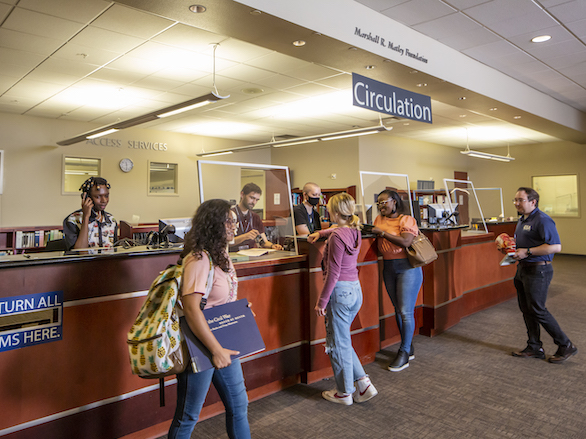
Identified and improved departmental efficiencies while continuing to support student and faculty needs.
Greater Western Library Alliance (GWLA) membership
Since joining GWLA, the Libraries has seen a 25 percent increase in the number of loans to GWLA libraries, while also reducing our borrowing requests so that the borrowing/lending ratio is nearly 1:1.
Implementing Article Galaxy
Since November 2023, the Libraries has purchased articles through Article Galaxy, reducing cost and improving speed of delivery to users. The Libraries will explore expansion in 2025.
Increasing the use of Interlibrary Loan by University graduate students
As a result of engagement at University events, graduate students requesting materials from other libraries saw a 12 percent increase in fiscal year (FY) 2024. In FY 2023 there were 3,020 ILL requests completed. In FY 2024 there were 3,381 ILL requests completed.
@One Digital Media Technology (@One)
The team promoted @One services designed to support research and scholarship activities through the Graduate Student Association and the Office of Research and Innovation. Topics of interest presented included digital media, digitization techniques, research poster printing, and lendable tech offerings.
Hosting XR Meet-Up
At the spring 2024 event, the @One team highlighted resources available to the campus community. A total of nine faculty and researcher presentations were given, representing six different departments. Total attendance was approximately 40 individuals.
Supporting the Graduate Student Association, lnnevation Center
The @One team attended a variety of Graduate Student Association events and provided large-scale event support for "Get Ahead of the Pack" and support for the "3 Minute Thesis Competition," including providing 10+ Chromebooks for the event. They also provided consultation expertise for event equipment and infrastructure needs at the University's lnnevation Center.
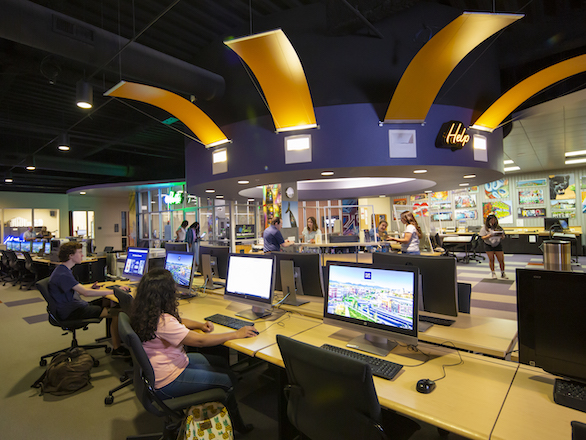
Providing @One services for University Research Symposiums and Graduate Student Association events
The @One team built new relationships and kept close contact with current users to ensure accurate information on @One services gets shared with key campus constituents. For example, the team worked to reach out to the Wolfpack Discoveries Research Symposium organizers regarding a plan for the poster symposium where approximately 180 posters were printed and 30 Chromebooks were checked out from the @One Lendable Technology department for the event. Additionally, a proactive poster printing communications strategy was used with the Graduate Student Association at their events.
Promoting @One Digital Media Technology projects and collaborations
By spring semester 2024, the @One team displayed and maintained an array of promotional content of past research-based @One projects and collaborations. During this time, the team showcased resources and inspired researchers to utilize the department's services. For example, the team posted signage about the Native American VR-based Baskets Museum, Hidden Cave, and Walking with Reality within the @Reality VR I AR Studio located on the first floor of the Mathewson-lGT Knowledge Center.
Partnering with University research community
The @One team strengthened and explored new partnerships with the campus research community through outward-facing and internal digitization projects. Each year, the team collaborates with University partners on at least one major project to bring attention and access to archives, collections, and/or locales. The team collaborated with the Jon Bilbao Basque Library on the Arborglyph Collaborative and also provided Lidar capture and 3D recreation of the Lilley Museum of Art on campus as well as the Sheppard Fine Arts Gallery.
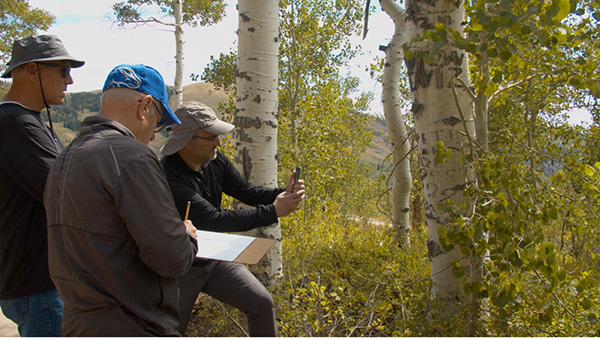
Jon Bilbao Basque Library
The Arborglyph Collaborative
The Arborglyph Collaborative is a tri-state academic partnership between University of Nevada, Reno, Boise State University, and California State University, Bakersfield utilizing grant funding to establish a network of interested organizations, to create protocols for documenting Basque arborglyphs, and to provide a framework for the public to more easily access information about these historical carvings.
The team from the Basque Library has presented at two international conferences:
- European Association for the Study of Science and Technology (EASST-4S 2024) Amsterdam: Making and Doing Transformations - "Land transformation in the American West: sheep, herders and tree carvings," Amsterdam, July 18.
- 34th Association of European Migration Institutions Conference: Beyond Work: Sports, Culture, and Arts within diverse societies in Europe across Time - "Voices from Solitude: The Basque Tree Carvings in the American West," Dudelange, Luxembourg, September 26.
Budget, e-Resources and Discovery Services (BERDS)
Faculty authors book collection
The BERDS team identified books by faculty authors, and acquired and cataloged books by current faculty back to 2017, adding older books for identified authors to an online-based virtual collection. The collection had 585 books as of November 2024 and continues to grow in size. Additionally, as part of the University's Sesquicentennial Celebration the team prepared an exhibit with faculty books featuring recent print books. This carefully curated book display was available to Libraries' users at the Mathewson-lGT Knowledge Center (MIKC) in the atrium on the second floor from June 2024 through October 2024. Furthermore, the team partnered with the Libraries marketing department to publicize the collection by developing a series of rotating video board slides which were displayed in the MIKC breezeway. Social media was also used to promote this collection.
The Collections and Discovery unit within the Libraries has been working since 2022 on identifying, acquiring and making available recent books authored, edited, and translated by University faculty. While the Libraries owned many of these books already, either in print or e-book format, the team has been acquiring copies of works that are still available in print to make sure the library has a tangible copy that will be preserved for the future.
DeLaMare Science & Engineering Library (DLM)
Enhancing research across campus
The DLM Makerspace secured 10 new computers for the Data and GIS Depot based on usage needs, targeting graduate student computing requirements. The team also collaborated with the Office of Information Technology to transition ArcGIS platforms from manual account setups to Single-Sign on logins and completed the migration from ArcMAP to ArcGIS Pro.
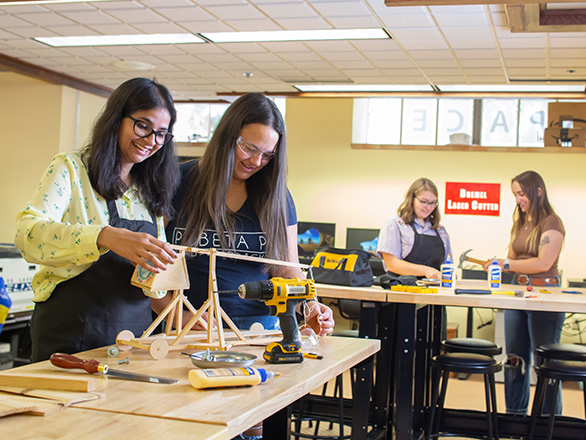
Expanding Makerspace equipment and facilities
DLM developed a bicycle workspace proposal to better support underserved populations at DLM by expanding facilities and Makerspace equipment. This includes purchasing additional tools, coordinating workshops, and preparing an impact statement to improve our League of American Bicyclists ranking from Bronze to Silver in collaboration with the University's Bicycle Working Group.
They also secured a Spring 2025 intern through the Nevada Supplemental Internship Program to enhance workshop offerings with donor-funded support, focusing on interdisciplinary and experiential learning.
The team analyzed income sources and found the largest income source at DLM comes from the Library's poster printing service. As a result, DLM was able to acquire a new poster printer to replace outdated machines and secured funding for necessary infrastructure upgrades.
Increasing awareness of data and Makerspace resources and services
The DLM team presented information on Research Data Services at the University's Research Council meeting in September 2024. Following the meeting, the team wrote a newsletter article highlighting the new Data and GIS Depot computers. The DLM team also conducted outreach to faculty in Engineering, Business, and Art to integrate new course sessions into the curriculum, and promoted maker literacies at Early Career Academic Faculty events.
Increasing data competency and expertise across campus
By offering Data Carpentry workshops the team helped increase data competency across campus. The team conducted two workshops for a total of 100 University graduate students, postdocs, and faculty, along with a requested training session for 13 researchers at the Larson Institute for Health Impact and Equity.
Digital Services
Collaborating with community partners
The team continued to collaborate with community partners to enhance access to and preservation of their historical materials, including Washoe County and Great Basin Science Sample and Records Library. In 2024 alone, the lab digitized 95,304 images for the Great Basin Science Sample and Records Library.
Promoting the use of Dryad
The team established and documented programming to fund, support, and promote use of Dryad and the Libraries preservation systems for research data. In the past year, the Dryad team collaborated with the Office of Research and Innovation to create an Open Access Challenge to encourage use of Dryad and ORCID.
Dryad is a data repository that allows researchers to store and share their research data. It's a secure, open-source platform that helps make data findable, accessible, interoperable, and reusable (FAIR), as promoted by funders and journals. Dryad plays a crucial role in libraries because it supports open science principles, facilitates compliance with data sharing requirements, and enhances the impact of research by making data widely available.
Metadata, Cataloging, and One-Time Acquisitions (MCOTA)
In FY24, the Libraries began promoting the newly migrated and rebranded Institutional Repository, ScholarWolf, which recently transitioned from the Research & Innovation office to the Libraries. Looking ahead, the team will focus on ScholarWolf promotion to students, researchers, and campus entities with the goal of increased regular deposits. They will also work to clean up existing metadata, with a focus on theses and dissertations, to adhere to new style guidelines, application profile, and technical requirements.
Research and Instructional Services (RIS)
Enhancing evidence synthesis
The Libraries' RIS team enhanced its evidence synthesis (i.e., systematic review) service by developing online learning objects and collaborated with Savitt Medical Librarians to create shared documentation for service provision. The team also promoted research services that support the intellectual property needs of local entrepreneurs.
Special Collections and University Archives (SCUA)
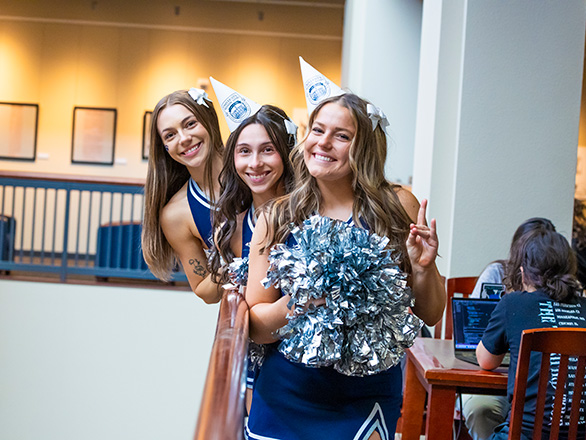
Sustaining campus partnerships
The SCUA Team created an internal transfer schedule for University Archives Records which will trigger annual contact with campus administrative assistants. The Community and University Archivist provided a presentation at the monthly meetings of administrative assistants on campus in November 2024. Topics included archival record review and how to work with SCUA.
Supporting the Sesquicentennial
The team played a major role in the University's Sesquicentennial celebrations by designing and implementing compelling exhibits on campus history, which served to showcase unique primary sources held by the department.
SCUA played a major role in the storytelling and exhibits related to the University's Sesquicentennial. The department hosted a total of seven pop-up exhibits in 2024 along with three installed exhibits. As of October 2024, the department had already exceeded 2023 exhibit attendance counts.
Institutional repository to ScholarWolf
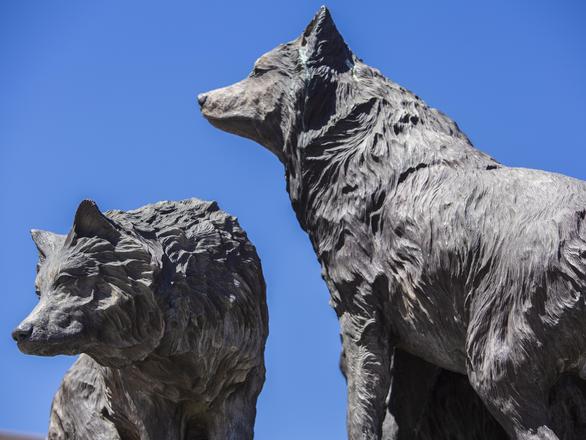
To create a more robust research infrastructure and better preserve the University's intellectual output while sharing it freely, the Libraries assumed responsibility for the University's Institutional Repository in Spring 2024. The Libraries migrated content to an updated system and re-branded the System (ScholarWolf) to signify this change.
It contains works from University members, including theses and dissertations, journal articles, conference presentations, grant reports, and some University Archive material. The materials in ScholarWolf do not require a paid subscription and the platform is an effective way to share research broadly.
Three units in the Libraries support ScholarWolf: Digital Services, Metadata, Cataloging and One-Time Acquisitions, and Research and Instructional Services.
From July to December 2024, the ScholarWolf team:
- Received, processed, and published 66 submissions from faculty and students on campus
- Ingested 270 theses and dissertations
- Welcomed users to the site who started 3,324 sessions and logged 18,527 total
page views
Exhibits and displays throughout the Mathewson-IGT Knowledge Center during the Sesquicentennial Celebration
The University Libraries team played a major role in celebrating the University's Sesquicentennial by designing and implementing compelling exhibits on campus history, which served to showcase unique primary resources held by the department.
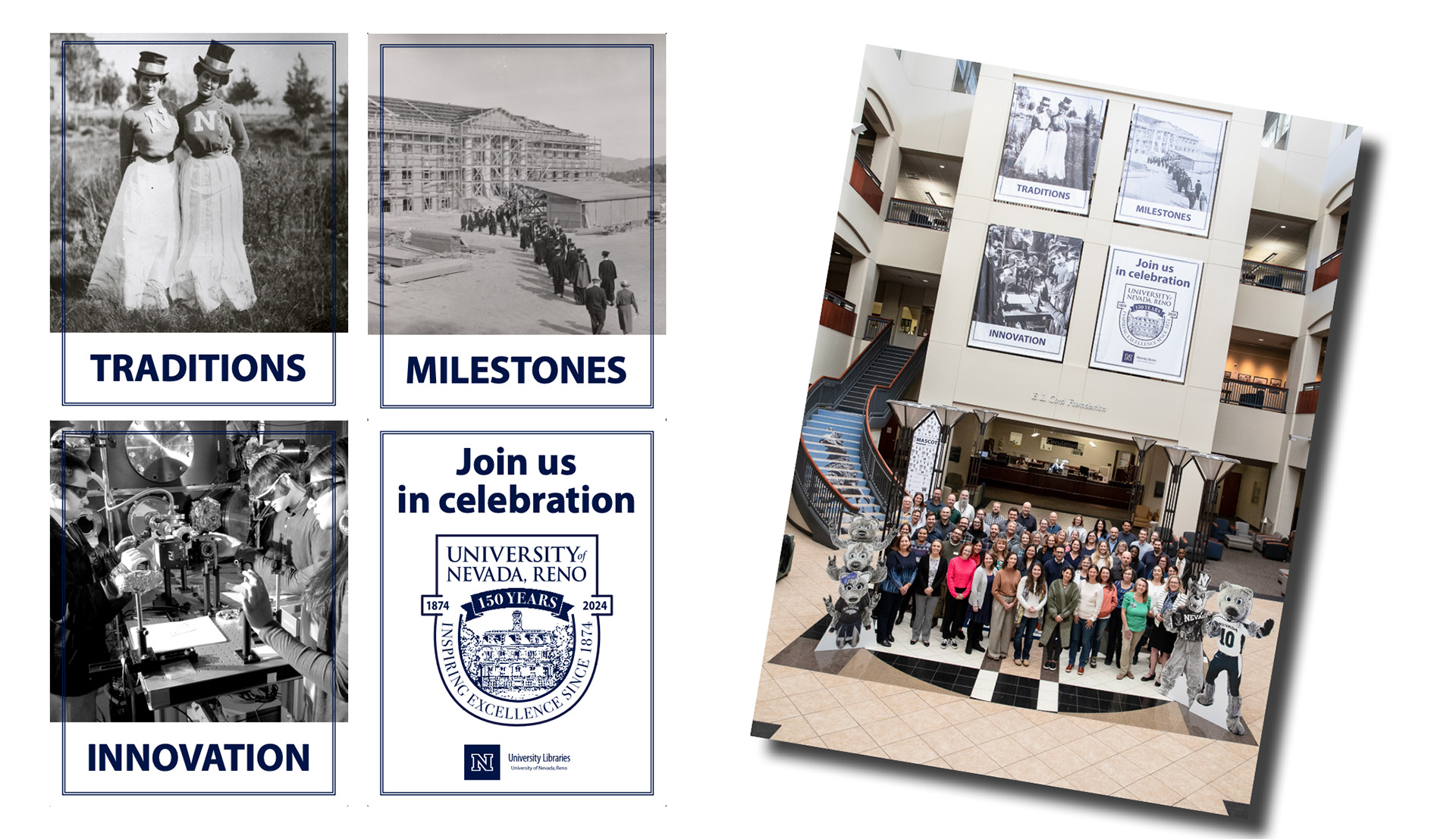 Large hanging banners in the Knowledge Center. These were 20ft wide by 7ft high.
Large hanging banners in the Knowledge Center. These were 20ft wide by 7ft high.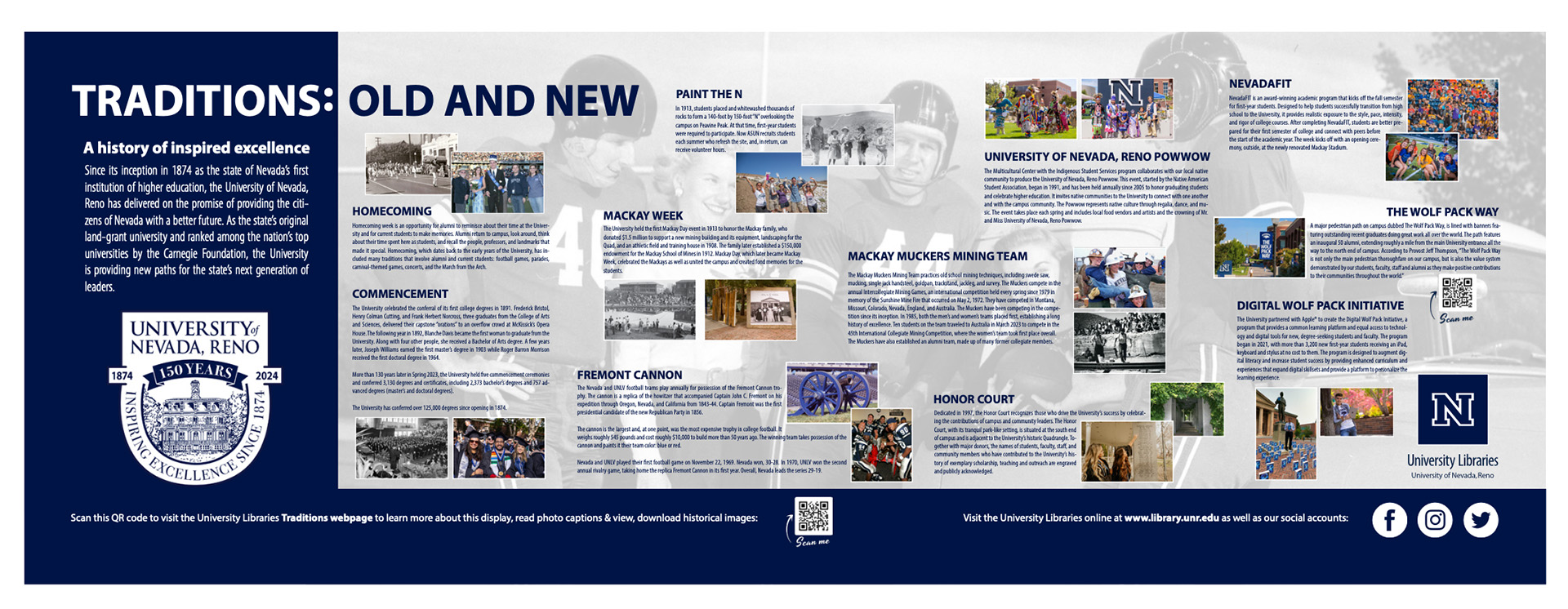 Traditions display
Traditions display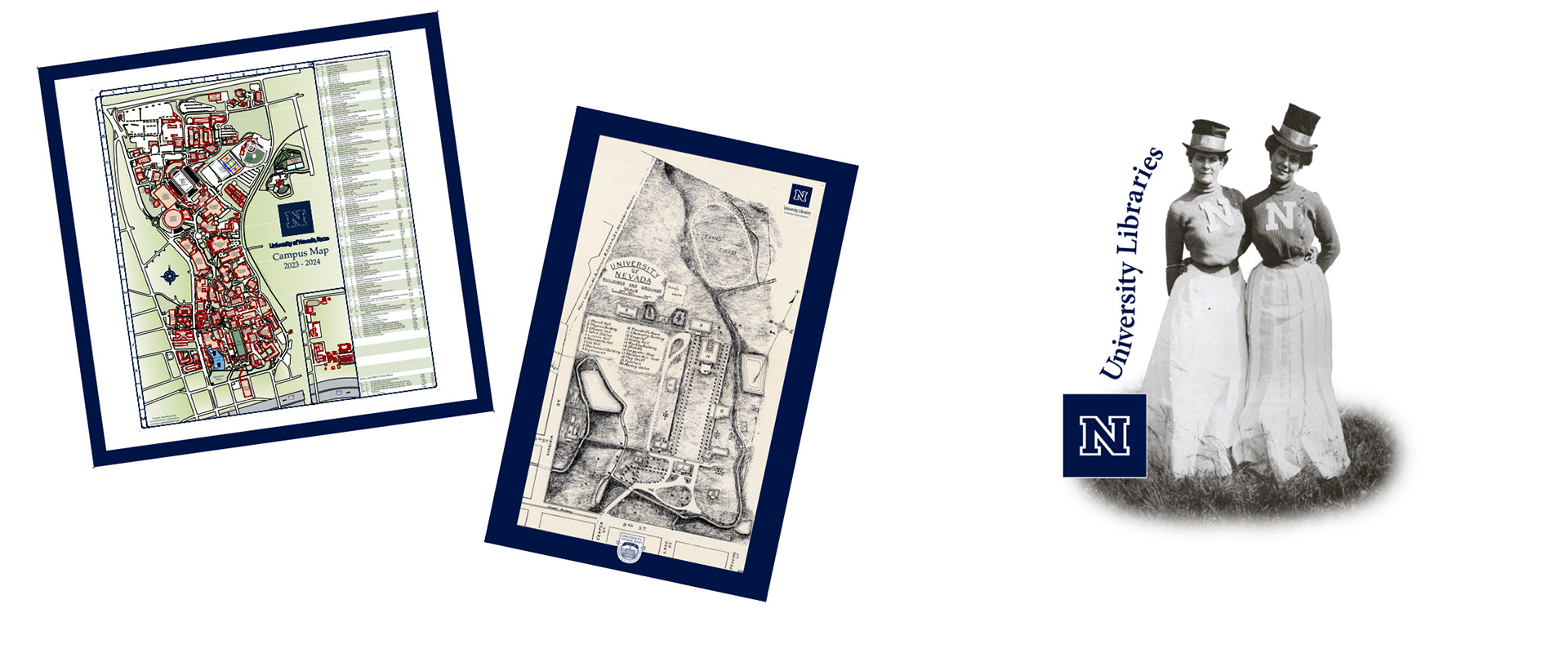 Floor maps: one modern and one historic (left) and die cut stickers (right)
Floor maps: one modern and one historic (left) and die cut stickers (right)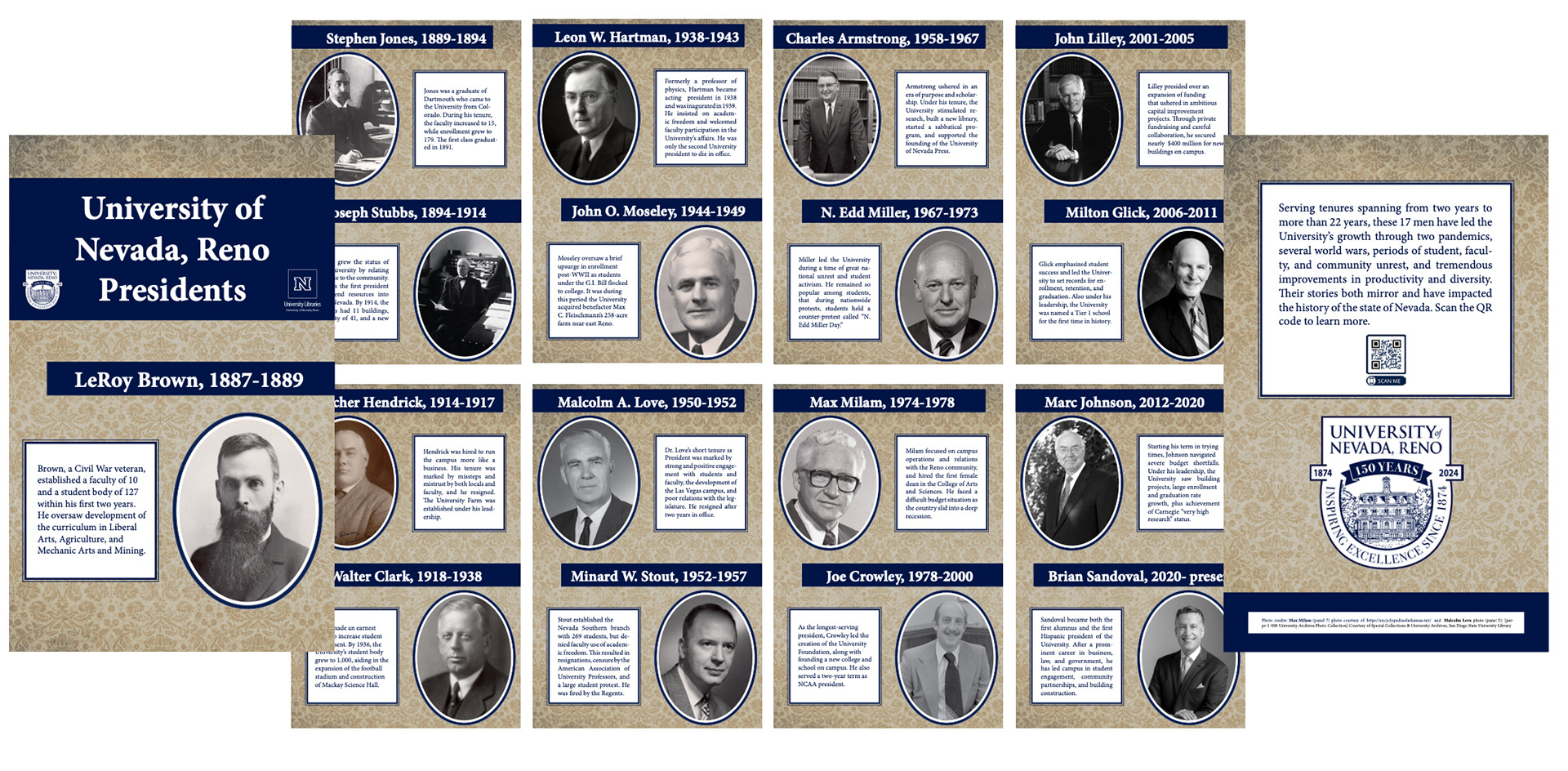 Presidential panels
Presidential panels